Venetian Afterthoughts
Post #1386 • September 8, 2009, 8:33 AM • 63 Comments
I attended Titian, Tintoretto, Veronese: Rivals in Renaissance Venice at the MFA Boston four times before it came down in mid-August. Friends of mine in Greece who hop over to Venice at least once a year expressed envy at their not being able to see this show, such was its quality, scholarship, and the geographic range of its lending institutions. It received due attention from Karen Wilkin, Jeffrey Gantz, Richard Lacayo, and Peter Plagens (update: Sebastian Smee as well), to whose comments I have little to add, so I want to talk about a tablecloth.

Titian (Tiziano Vecellio) (Italian (Venetian), about 1488 1576): Supper at Emmaus, 1533–1534, oil on canvas, Louvre, Paris, France, Réunion des Musées Nationaux / Art Resource, courtesy, Museum of Fine Arts, Boston
Despite the rivalries accurately portrayed by the exhibition, which became sufficiently convoluted to pit a wary alliance of Titian and Veronese against Tintoretto for commissions, neither of the younger masters exceed Titian. Next to him, Tintoretto often looks like he's loading up his canvases with proto-Baroque buffoonery, and Veronese looks sugary and somehow French, in a bad way. The plain white tablecloth in his Supper at Emmaus settles it. When I revisited the show, it was in part to see that tablecloth. I found out that a friend of mine here in Boston had done the same thing.

Supper at Emmaus, detail
Depicting the extraordinary, gods, heroes, angels, beauties, is going to draw your viewer in no matter what. It is a higher order of talent to render something commonplace in a manner that rings with the plangent beauty one would associate with Venus or Susannah, and Titian has done so here. Good as Tintoretto and Veronese were, in this respect, there was no rivalry. Titian understood oil painting to a degree that would have enabled him to invent Impressionism from first principles; indeed, with the loosening of his brushstroke in his later career, he arguably did. Despite his start in Bellini's studio and its egg/oil method, he quickly developed a faith in the powers of oil that sustained his production at an incomparable level.
I miss this show and wish it had never left the museum.

Giovanni Bellini and Workshop: Virgin and Child with Saints, about 1505–1508, oil and tempera on wood, lent by The Metropolitan Museum of Art, The Jules Bache Collection, 1949, courtesy, Museum of Fine Arts, Boston

Jacopo Tintoretto: Nativity, late 1550s, reworked 1570s or 1580s, oil on canvas, Museum of Fine Arts, Boston, gift of Quincy A. Shaw, photograph © Museum of Fine Arts, Boston
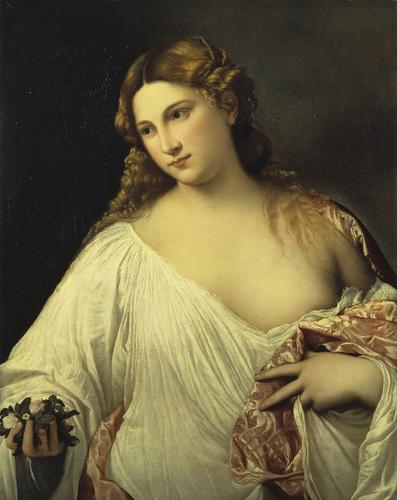
Titian: Flora, about 1516–1518, oil on canvas, Galleria degli Uffizi, Florence, Scala/Ministero per i Beni e le Attività culturali / Art Resource, NY, courtesy, Museum of Fine Arts, Boston

Paolo Veronese: Mars and Venus United by Love, mid 1570s, oil on canvas, lent by The Metropolitan Museum of Art, John Stewart Kennedy Fund, 1910, courtesy, Museum of Fine Arts, Boston

Jacopo Tintoretto (Jacopo Robusti) (Italian (Venetian), about 1518 1594): Saint George, Saint Louis, and the Princess, 1552, oil on canvas, Accademia, Venice Italy, Cameraphoto Arte, Venice / Art Resource, courtesy, Museum of Fine Arts, Boston

Paolo Veronese: Virgin and Child with Angels Appearing to Saint Anthony Abbot and Saint Paul the Hermit, 1562, oil on canvas, Chrysler Museum of Art, Norfolk, VA, gift of Walter P. Chrysler, Jr. in memory of Della Viola Forker Chrysler, © Chrysler Museum of Art, Norfolk, VA, courtesy, Museum of Fine Arts, Boston
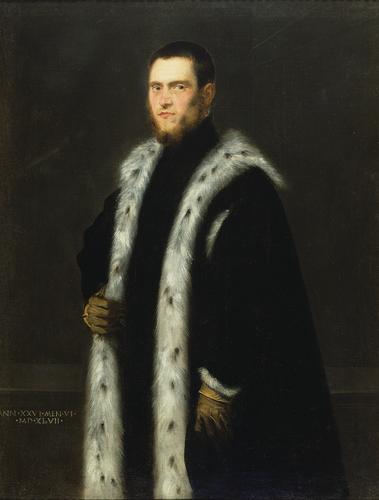
Jacopo Tintoretto: Portrait of a Man aged Twenty-six, 1547, oil on canvas, Kröller-Müller Museum, Otterlo, Collection Kröller-Müller Museum, Otterlo, the Netherlands, courtesy, Museum of Fine Arts, Boston
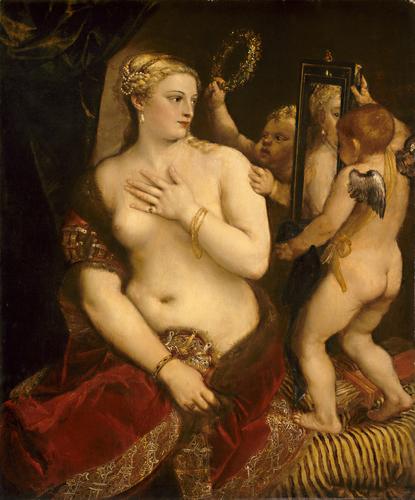
Titian: Venus with a Mirror, about 1555, oil on canvas, National Gallery of Art, Washington, Andrew W. Mellon Collection, courtesy, Museum of Fine Arts, Boston
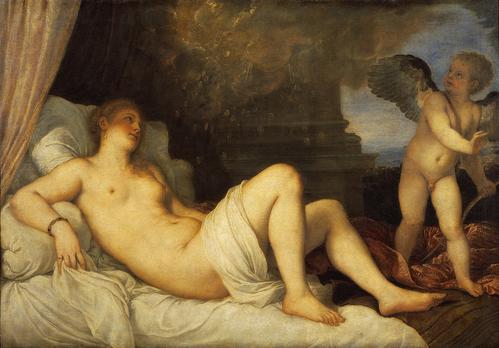
Titian (Tiziano Vecellio) (Italian (Venetian), about 1488 1576): Danaë, 1544–1546, oil on canvas, Museo Nazionale di Capodimonte, Naples, Italy, Scala/Ministero per i Beni e le Attività culturali / Art Resources, courtesy, Museum of Fine Arts, Boston
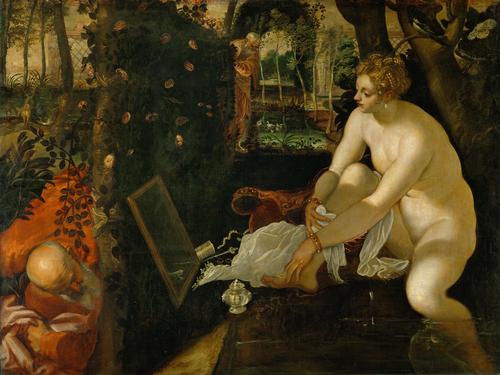
Jacopo Tintoretto: Susannah and the Elders, about 1555–1556, oil on canvas, Kunsthistorisches Museum Wien, Gemäldegalerie, Erich Lessing / Art Resource, NY, courtesy, Museum of Fine Arts, Boston
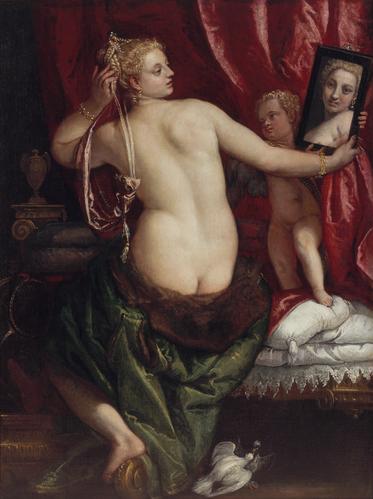
Paolo Veronese: Venus with a Mirror (Venus at Her Toilette), mid 1580s, oil on canvas, Joslyn Art Museum, Omaha, Nebraska, Museum Purchase, 1942, courtesy, Museum of Fine Arts, Boston
2.
September 8, 2009, 8:30 AM
That is some hot painting boy.
3.
September 8, 2009, 8:37 AM
Though I am loath to hear, much less make, statements like the one that follows, here goes:
Titian may well be the best painter of all time.
4.
September 8, 2009, 8:43 AM
while i have never seen the picture in person, based on what is see here and past experience, i am willing to go out on a limb to say that i bet the tintoretto "portrait of a man aged 26" is a very good tintoretto.
5.
September 8, 2009, 9:37 AM
I'm sorry I missed this. Did you mention it before it came down? I'm not sure if I heard about it before or not.
"I want to talk about a tablecloth." Excellent way to begin anything.
6.
September 8, 2009, 10:21 AM
I'm sure glad we're off Beck.
7.
September 8, 2009, 11:43 AM
We respond so readily to Titian as much as anything else because the naturalistic cast of his figuration with its decidedly worldly character is harmonious with the material base of our culture. His suave handling of paint and confident color orchestration affords one lesson after another in how to depict, see, and enjoy material reality. But, because it is coming essentially from our cultural biases, this is not necessarily the best basis for critical assesment.
By comparison, for example, Tintoretto was far more inventive and daring than Titian ever allowed himself to be. And Veronese never missed with the integrity of his compositions, which could make some of Titian's compositions look flattish, stiffish, and at times a little clumsy.
A lot of the things of his later years, so celebrated for their innovative technique, seem scruffy and rather brown. I accept an indirect connection, if there is one, with Impressionism, but I link Impressionist technique more with Velazquez (who took a cue or two from Titian), Rubens, Delacroix, and Hals than with Titian.
And, after I've exausted the materiality of Titian, I don't find in his work the something essential that keeps me engaged in the things of, for instance, Giorgione and the Bellinis. Instead, I have to put Titian away until withdrawal symptoms spur me to seek a materiality fix. Then I go straight to Titian.
8.
September 8, 2009, 12:06 PM
Tim what do you mean by materiality?
9.
September 8, 2009, 12:09 PM
Tim, materialistic pleasure is the basic effect of art, including "spiritual" art, such as your own stunning windows. Whatever else comes along with it, comes along. But without the materialistic pleasure, the rest is just propaganda.
I suppose I can agree that, in some less than accurate sense, taste is involved with "cultural bias". But I would call it "cultivation", not "bias". Everything that is preferred is a vector of some sort. "Bias" suggests the vector points away from being objective. "Cultivation" suggests the vector points toward excellence. If ever there was an excellent artist, it was Titan. Why impugn his achievement with a biased word like "bias"?
10.
September 8, 2009, 12:43 PM
John S, by materiality I mean that which is physical, material.
John, "...without the materialistic pleasure, the rest is just propaganda." Without the rest, it's just the materialistic pleasure. For me, materialistic pleasure has to be a doorway into something beyond that or it's a rather quickly exhausted dead end.
What I meant by cultural bias: one of the kinds of subjectivity inevitably brought to seeing and assessing. My intention was not to impugn Titian's achievement, but to put it in perspective. I've always held Titian to be an excellent painter, and I don't think my comments take away from his qualities.
Thank you for the generous compliment.
11.
September 8, 2009, 1:12 PM
'I'm sure glad we're off Beck.'
Yes, thank the virgin and the wee baby christ.
12.
September 8, 2009, 1:38 PM
The right arm (her right) in the Titian 'Venus with a Mirror' looks like it was moved or adjusted and then not quite sorted out.
I just can't get enough of those fur collars.
Masterworks force you to contend with the how of it all in a very special way. The 'materiality' in works such as these is so bound up in the content and design you just can't refute the singular specific experience that visual art like this provides. I always vascillate in front of work like this - between being awed by technique and material on one hand, and then being plunged wordless into the glorious design and affect of these immaculate pictorial beings. Yum. Yes, more like this please. I'm so glad to hear you got to see it FOUR(!) times Franklin. I woulda been there too.
13.
September 8, 2009, 1:53 PM
Next time some of you people see a train's gonna wreck, I suggest you avoid getting on it, as I deliberately did before there was even a single comment up (and no, I didn't read any of the comments, not even one). I am so grossed out by politics in general that I'll be damned if I'm going to get into the fetid, nauseating business here.
But yes, that tablecloth rules.
14.
September 8, 2009, 1:55 PM
If I understand the differences here, I would have to agree with John. "Liking" often depends on bias; I detect these kinds of art preferences in myself. And we often get to "art" by "liking".
But when you get down to the nitty gritty good art corresponds with something deeper than all that, something neurological and permanent, I suspect. Something about "life". This is why we make such a big deal of it.
I use all thos quote marks to announce I am not prepared to say exactly what I mean by the words they enclose.
15.
September 8, 2009, 2:14 PM
I keep coming back to Danaë, damn fine painting.
16.
September 8, 2009, 2:46 PM
Opie, in the following, I don't know if I've used 'liking' the way you meant it.
Just after college, I discovered that 'liking' caused me to discount a lot of painting that I didn't understand and was not equipped to get then. But the art I was discounting kept appearing in every art history survey I looked at. So, I decided that that art deserved the benefit of the doubt and I subjected myself to daily exposure to it by hanging repro examples of it in my household.
After about 3 or so days from when something new is installed in my digs, I begin not to notice it consciously as it takes its place in the surroundings. That was the case with those repros. As time went by, I would unintentionally notice them, one by one. Each time, a veil would lift and a Eureka moment would occur: "Oh, THAT'S it! NOW I get it."
I decided that my 'liking' was acting as a filter, letting only what I liked, what corresponded with my aesthetic or other values, in. But that filter doesn't exist outside of consciousness. So the art got in and had its effect where the filter wasn't operating. And something about the seeing of a repro triggered that effect into consciousness, where the effect 'identified' immediately with the corresponding image in the repro. Those were and are priceless moments.
17.
September 8, 2009, 3:14 PM
To add something possibly bothersome to the discussion: What Tim calls the materiality, and what I think makes others here interject about the fur collars or the tablecloth, is what I've some to see as the optics revolution in art as described by David Hockney in that book I've mentioned before, Secret Knowledge: Rediscovering the Lost Techniques of the Old Masters. After having read Hockney's book, these things fairly leap at me: That tablecloth is so clearly modeled from optical projections it's not even funny. No human eye ever saw a tablecloth like that.
I don't think it takes away from the achievement so much as it places it outside of my own framework, like Olympic sprinting or skydiving. When Dude says something like, "Masterworks force you to contend with the how of it all in a very special way," I don't get that any more, not the way I used to. I used to think, wow, that's incredible! How can I do that? Now I think, wow, what a nice use of tools and techniques I don't feel like practicing. With the caveat that even if I did, I probably wouldn't get that good anyway.
To add some politics to the discussion, I should note that I was able to read Hockney's book thanks to that most socialist (or is it communist?) of non-profit government-run entities, the public library system. Thanks, robber barons of the 19th century! (If only we had some modern-day robber barons interested in universal health care the way Carnegie was interested in reading.)
18.
September 8, 2009, 4:04 PM
As Hockney says himself, the optical tools don't make the marks. Hockney's pedestrian camera lucida portraits make his case, unfortunately, modeled as they are on Ingres and falling so short.
Materiality, celebrated at this level of sensitivity, is spirituality itself.
19.
September 8, 2009, 4:09 PM
It's true that the tools don't do the work, but the tools do make the work possible. If ever you've tried to repair your car with only a hammer, you'll understand clearly what I mean.
20.
September 8, 2009, 4:34 PM
By the way, one more reason to hate Roland Barthes: I went looking to see how much I could buy a camera lucida for so I put "camera lucida" into Google's Product Search. Instead of actual cameras lucida, I got back about ninety-five million hits for Barthes' book of the same name.
21.
September 8, 2009, 4:47 PM
I got mine from here. Frankly, I had trouble getting good results from it. There's a practice element to it just like anything else. I think it might be great as a teaching device, though.
22.
September 8, 2009, 4:55 PM
I might add that I couldn't repair my car with every tool in Pep Boys at my disposal, which may be more to the point here.
23.
September 8, 2009, 7:06 PM
I thought this one looked nicer but they both seem kind of expensive. I want to spend, like, twenty bucks, not a hundred. Oh well. Maybe I'll come up to Boston and play with yours.
As far as tools go, I'm always amazed at how much easier everything is with the right tool. You may not be able to repair your car right now with all of Pep Boys at your disposal, but if you tried, it'd take a fairly short amount of time before you could learn most what you needed to know. Meanwhile just changing the oil is pretty much impossible without a couple of key tools, and attempting it without Pep Boys would only frustrate you.
Similarly, trying to get Old Master effects without Old Master tools is a recipe for frustration. With the tools it may be challenging, but without them, it's impossible.
Which is why, after years of trying to get, well, not Old Master results, but at least limp Surrealist results, I only made myself cranky. Wrong tools. Now that I know that, I feel better about changing my direction.
24.
September 8, 2009, 7:07 PM
Not that limp Surrealism was much of a worthwhile goal in any case.
25.
September 8, 2009, 8:50 PM
"Materiality, celebrated at this level of sensitivity, is spirituality itself."
Not really, though so many aficionados of Middle and Late Renaissance painting like to say that. Spirit is immaterial.
26.
September 8, 2009, 8:56 PM
Chris, Surrealism was never a good idea, period (probably because it was too much of an idea, which made its proponents unduly impressed with their supposed profundity, not unlike pot smoking). Like I keep saying, the idea per se (any idea) doesn't mean shit in visual art unless the resulting object is sufficiently compelling visually. You'd think everybody would have caught on by now.
27.
September 8, 2009, 9:12 PM
Spirit is immaterial.
Maybe not. Dogen: "To study the Way is to study the self, to study the self is to forget the self, to forget the self is to be enlightened by the ten thousand things."
Surrealism might have worked out better if more was demanded of it. I've liked the Max Ernst I've seen. Of course, there's automatic surrealism, without which we wouldn't have gotten so much good abstraction.
I meant to confirm 1's comment: Yes, that Tintoretto portrait is an excellent Tintoretto. It's testimony to what he could accomplish when he exercised restraint.
28.
September 8, 2009, 9:34 PM
"To study the Way is to study the self, to study the self is to forget the self, to forget the self is to be enlightened by the ten thousand things." Better for all to direct the self, God's gift, rather than forget it.
Re confirmation of #1's comment: Was Tintoretto exercising restraint or was the client requiring that Tintoretto reflect values?
29.
September 8, 2009, 10:21 PM
re: 12. Titian's Venus' right arm may be a little out (on a limb), but Veronese's Venus' left leg is so long it might better suit a moose.
30.
September 8, 2009, 10:59 PM
Tim #16 I think what you are describing was exactly what I was referring to.
31.
September 8, 2009, 11:28 PM
'something deeper than all that, something neurological and permanent, I suspect. Something about "life". This is why we make such a big deal of it.'
'materialistic pleasure is the basic effect of art'
'Materiality, celebrated at this level of sensitivity, is spirituality itself'
Thought and feeling occur fast. Where spirit gets involved I cannot say for much the same reason I cannot say anything too specific about quality. In front of Titian I am face to face with some kind of supreme effort born of love and blood. Part of the thrill must be that this kind of swooning usually spills out into the world, whereas art holds you and satisfies with its specificity. How the artist gets a charge into the work is of no real concern. Only that it is there. You learn to spot it. You learn it can be elegant and clumsy too. It makes you cranky just like real hunger once you learn to see how things can be better, and then old disappointments you couldn't properly see turn into satisfactions and you're on your ass again.
We are a mess without discipline, but it churns out all the stuff that matters. And once you get out deep enough, Titian and others on his level are like the best junk. It's a bitch and there's no turning back. Now you need an innovator like a Titian or a Velazquez to stir it up. Sorry for the analogy, but often that's what I feel like, a junky looking for a hit.
Chris, what i mean to say in confronting the material and the 'how' is not "whoa, check the illusion," those days are gone for me too and verisimilitude is a pretty limited source for quality anyway. I'm way hungrier than that now. The complexity or depth all hinges on familiarity - and you get harder and harder to satisfy. Conventions and technique become like classic flavor combos, the base constants that real complexity develops from. But you have to like looking at this stuff.
There is a Titian (there are probably many) portrait with a spotted fur collar that I'm familiar with that I think of on seeing the Tintoretto. The mass and the pattern dominate and make it so abstract and modern. It's also about the light, the smoky greys and browns and a silvery finish to it all. For me I see a link on through to the Spaniards and they pile on their blacks and on then through the Barbizon and then Manet, oh Manet. Here is a rightful heir to Titian, where consummate skill (like top of the heap kind of skill) has nowhere to go but into the material for complexity and satisfaction.
32.
September 8, 2009, 11:42 PM
re 29: Ya it's not out much but it's enough to make me wonder. Of course there is all kinds of willful distortion going on.
33.
September 9, 2009, 6:08 AM
Jack sez:
Like I keep saying, the idea per se (any idea) doesn't mean shit in visual art unless the resulting object is sufficiently compelling visually.
Well, I agree with you now. Back when I was pursuing Surrealism I wouldn't have formulated it the same. The chasm between conceptual and visual wasn't one I knew about.
Dude sez:
Conventions and technique become like classic flavor combos, the base constants that real complexity develops from.
I see what you're saying, Dude, and I think I understand and agree. I was being oppositional yesterday, not for any good reason. I think I was just cranky.
34.
September 9, 2009, 8:24 AM
For a long time - decades - I really disliked Titian's way of painting, particularly the late work. Then - weirdly, through looking at the painting of Frank Auerbach, of all people - I suddenly 'got' him, and for another decade or so I was totally convinced that Titian was the greatest painter ever, full stop.
Although I'm a bit more relaxed about the whole 'greatness' thing now (what about Giotto? what about Chardin? and how do you compare a small easel painting with a whole fresco-lined environment? etc, etc) he's still one of those artists beside whom everyone else is judged.
What I hated about him and what I loved about him were, in retrospect, indistinguishable. As a painter, Titian asserts his identity as a painter very loudly, so that in places it's almost the subject of the painting - one sees the painting there, the pigment applied the way only Titian would or could do it, long after the subject, narrative or even the ambient mood has ceased to matter. And there are times when that self-confident brilliance can seem over-assertive, even a little bit thuggish, just as there are moments when it feels intimate, where the fingerprints literally there in the paint seem to bring one very close to another human consciousness. Defending one's own way of seeing the world against someone else's genius can be hard work - or it can be magical.
On nights when I'd read Titian monographs too long before going to sleep, I used to have Titian-inflected nightmares, where everything around me looked like it had been painted by Titian - his gestures, his thick or thin paint, the pitch-perfect irresolution of something like that magnificent ruin, The Death of Actaeon at the National Gallery here in London.
Anyway, Franklin, I'd be more envious, had I not just discovered that this exhibition is opening soon in Paris - so now I'm making travel plans! But before I go, this -
somehow French, in a bad way
- is hilarious - and yet totally comprehensible, too.
35.
September 9, 2009, 8:50 AM
Yay. I wondered if this post might flush Bunny out. From Auerbach to getting Titian, interesting. See how weird this stuff is? There's nothing like it. Yet many in our day would toss that singular connect with Titian aside and bother instead with some ridiculous discussion about the Venetian in Auerbach or the proto-Expressionism in Titian. I think they call it the Aesthetics of Discourse.
36.
September 9, 2009, 10:26 AM
This is hardly an indispensable or even necessary observation, but I'm reminded that, reportedly, Titian was not the nicest person as a human being. It's beyond dispute that Picasso wasn't, but with Titian it doesn't matter (to me) because his oeuvre, until the very end, is magnificent, practically beyond compare. The story is very different with Proud Pablo, and his rather serious character defects are increasingly intrusive (to me) when faced with his work, especially his distinctly inferior later work (which is so distressingly abundant). Anyway, carry on.
37.
September 9, 2009, 12:28 PM
Picasso, mostly through reading Patrick O'Brian's biography, doesn't strike me as more than especially flawed. He was an egotist and apparently brusque and distant, and a womanizer, I suppose. But not the worst guy in the world. I suspect if I were in his position I'd be egotistical and a womanizer myself.
I guess there's something to be said for my not trying to put myself in that position, but not a lot, really.
I don't know much about Titian. I saw Simon Schama's show on Caravaggio, so I know he was a hellraiser, but Titian, I got nothing.
38.
September 9, 2009, 1:39 PM
Chris, I didn't say Picasso was Stalin, and if you only suppose he was a womanizer, you didn't read that biography too carefully. My basic point was that he had the kind of bloated ego that would be "OK" for someone with a career and body of work like Titian's, but not his. He ran out of gas, so to speak, fairly early, and a lot of his later (painting) work is frankly embarrassing. I guess it's OK to live off former glories or reputation if you can, and people will do it anyway if possible, but considering how long he ran on gas fumes as opposed to actual gas, he should have a been a tad more cognizant of reality (no matter how many sycophants and rich idiots were around to "encourage" him).
39.
September 9, 2009, 4:42 PM
I said "suppose" because it depends, I suppose, on your definition of womanizer. When it comes right down to it, most men seek positions of power to improve their quantity and quality of mating partners. The French understand this better, which may be why Picasso fit in so well there, and Bill Clinton fit in so badly here.
I think you're selling Picasso too short here, too. (A height joke!) His later work isn't all bad. I think with old Pablo the thing is there's just so damned much of it. There was bound to be a quality issue considering the vastness of his output.
Titian, meanwhile, had help. Maybe Picasso did, too. The bio didn't say, but you know how it is with artists.
I probably like Titian better than Picasso. I'm not sure, though, because I haven't seen much Titian. I was thinking earlier that I'm not sure I've seen any in person. Maybe at the Met.
Wikipedia doesn't say much about Titian as a person. There's a lot about his career and mentors and so forth, but very little about whether he was a jerk.
40.
September 9, 2009, 5:28 PM
Titian was reportedly notoriously greedy, though admittedly there are worse flaws. The fact Picasso was a womanizer can be seen as more or less acceptable depending on your viewpoint, but there's no question he was one. I didn't say all his later work was bad.
Again, my main point is that he carried on as if he were unquestionably the greatest artist alive not only in his prime, but long after he was past it (and we're talking decades). I'm sorry, but that's a little too much hubris for me. I'm funny that way (among others).
41.
September 9, 2009, 6:58 PM
"Womanizer" is so loaded. "Serial monogamist" perhaps.
42.
September 9, 2009, 8:07 PM
I'll give you serial user, Chris, if that works better for you, but that's not what really bothers me about Picasso (all those women chose to be used). In a way, what bothers me is that too much was made of him for too long by too many people (and of course he ate it up and milked it for all it was worth, which I suppose is to be expected, whether it's him or anybody else in a similar situation).
Let me rephrase that: it's not that he wasn't a big deal, but he kept being treated as if he never went downhill, which he all too clearly did, and the decline started fairly early and progressed to a kind of self-parody. It appears he never noticed, or at least he kept playing Mr. Greatest Artist indefinitely.
Overbearing, in-your-face ego is never especially attractive, but some cases are more tolerable than others. I'm not saying he should have become a suicidal drunk, but a little more sense of proportion would have been very fitting, not to mention welcome.
43.
September 9, 2009, 8:59 PM
The trouble is what Robert Anton Wilson calls the SNAFU Principle: True communication is only possible between equals. As soon as one person has power over another, those with less power start telling the powerful person what they want to hear, not what's true. The higher the pyramid, the more delusional the top of it.
Picasso wasn't very powerful in the scheme of things, but in his circles, he was powerful enough. Who was going to tell him the truth?
I think Picasso was worried enough about his failings. He may have played the part of the Greatest Artist but I have gotten the impression he felt his failing faculties. He was always worried about his baldness, for example, and he mostly wore those striped sailor shirts because he felt they made him look energetic. His womanizing may have been compensating, also.
In all, I feel sympathy for him, too. And ultimately I realize none of us will ever really know what he was thinking or feeling. I mean, I've been with my wife for 21 years now, spending nearly every day and night together, and I don't know her at all.
Also, thinking about this I have to wonder: Is it acceptable to excuse a man his extreme failings just because you like his work? Should Titian get a pass on his doucheyness but not Picasso, since Titian kept up the quality of his painting?
I'd rather -- and you probably do, too -- just think about their work and judge them on that basis, and leave the biographical speculation aside, except for occasional forays like this one.
44.
September 10, 2009, 12:27 AM
Vasari doesn't give the impression that Titian was unpleasant or a bad person, exactly. To the extent that he implies Titian was greedy, there may well have been a more serious motive: implying that the greatest external threat to the dominance of Tuscan painting was just another grasping, venal Venetian, who not only couldn't draw but but was totally uninterested in the more noble, intellectual side of life. Which, of course, can't have been quite right, because Aretino and Ariosto were both friends of his, so he clearly wasn't just some money-grubbing hack. But what Vasari writes about Titian has to be seen in the context of the claims he was making about his Tuscan heroes, most of all Michelangelo.
Whether it matters, of course, is another question. I'm sure that Eric Gill's wretched personality gets in the way of my appreciation of his work, but then Gill was not exactly up to Titian's level anyway.
Finally, earlier this year the National Gallery (London) put on a show including lots of Picasso's late work - considerably more than I had ever seen in one place - and although I went with low expectations, I left amazed at how few 'bad' paintings there were, and how much skill, charisma and vitality. Clearly, his work at the end of his life wasn't up to the level of his greatest work, but it may well be better than its current reputation suggests. I'd love to see even a 'bad' late Picasso put in a room with something by Peter Doig or Elizabeth Peyton at their 'greatest' - no matter who's nice or nasty in that competition, it's pretty clear who'd win.
45.
September 10, 2009, 12:19 PM
OK, so I'll indulge my psychoanalytical bent--such as it is. Picasso became enough of an international celebrity, media star and famous character, that all that was required of him to retain his position was to go through the motions, continually strike the Picasso Pose, and act as if 1965, say, was no different from 1910. Certainly, he knew his work, practically any work, would continue selling for top money based on his signature alone (there are always plenty of rich autograph collectors).
Then there was his innate egocentricity or compulsion to assert/impose himself, which would be only too flattered and too tempted to take advantage of such an advantageous situation. The question thus arises, why wouldn't he? It's not as if he was forcing anyone to ignore his decline, and the fact it was effectively ignored meant he could ignore it himself, if he wished. No need for striped sailor attire there.
In other words, I suppose asking or expecting him to have behaved differently would be tantamount to expecting him to have become someone other than Picasso.
46.
September 10, 2009, 1:10 PM
I guess I'm sympathetic towards Pablo because I think, given the relatively early success, and level of success, he achieved, I'd probably have behaved the same way he did. I mean, he clearly played the part of World's Greatest Artist and plenty of people went along with it, and honestly, if I thought I could get away with that kind of crap, I would. I'd probably be a womanizer if the women would let me.
So I'm sympathetic that way. There but for talent and ambition go I.
I agree with Bunny, too: The recent show of his later work was surprisingly good. And I never saw much in his earlier work to get me too excited: Les Demoiselles d'Avignon does nothing for me.
47.
September 10, 2009, 1:25 PM
Bunny, as always, I absolutely respect and appreciate hearing your opinion, and I wish I'd been able to see that NG show you mention. I might have come away from it feeling similarly. However, I have definitely seen bad latter-day Picasso painting, and I think the last sentence of your comment is both spot on and highly relevant to the matter under discussion.
In other words, it's at least partly (if not largely) a matter of relative merit. I have had essentially the same experience you describe listening to recordings of some opera singers who were not considered first-rate in their day, but now sound marvelous compared to current singers. Which perception is truly accurate? Well, it rather depends on one's expectations (low in your case before seeing that show) and what one compares things to--the likes of Elizabeth Peyton in the same case.
But yes, part of my problem is a personal aversion, of sorts, to Picasso the man. In addition to diminished artistic powers and the aforementioned Picasso Pose, the fashionably leftist posturing of a rich, pampered celebrity wallowing in creature comforts and abject adulation does not raise him in my estimation, either. I suppose we all have "issues," as they say (at least in the States).
48.
September 10, 2009, 3:52 PM
What beautiful manners you have, Jack.
Obviously your point about relative merit is more or less incontrovertable. One of my minor complaints about the recent National Gallery show - afflicted as it was with the provocative title 'Picasso - Challenging the Past' - was the diplomatic tact, verging on mendacity, with which the curators avoided the sort of head-to-head 'challenge' not only suggested by the title, but presumably facilitated by holding the exhibition in a gallery stuffed to the rafters with work by artists important to Picasso. That, at least, would have been worth seeing, if only to help settle the question of whether Picasso was, in fact, any good or not - but the opportunity passed, with the perhaps perverse result that the curators' failure of nerve seemed almost to speak for itself, and not in very encouraging terms, either.
As for 'issues', too, we're in agreement - on the fact that they exist, at least, if not on the infinitely complex and personal business of their correct targetting. For what it's worth, I don't dislike Picasso. My highly subjective judgement could be dissected - early exposure to John Richardson's broadly appreciative if sometimes spikey portrayal, growing up in a culture that embraced both male arrogance and also the creepy passive-aggressive female power that there's sometimes in Picasso's work, the distorting polarity of a parent whose own apparently glamorous early Marxism probably made me softer than I ought to be on people who still had nice things to say about Communism long after they really should have known better - but to what end? The accidental and the objective are, at this point, pretty thoroughly gummed together. Personally, my own doubtfully rational dislikes remain broadly focused on Louise Borgeois: get over it, woman, there are people in this world with real problems, and you're not one of them! So, no real argument there, either.
If this were my blog, I'd now derail a perfectly sensible conversation by asking you to name those earlier opera singers - but it isn't, so I won't.
49.
September 10, 2009, 4:10 PM
I permit it, by all means.
50.
September 10, 2009, 5:24 PM
Oh, dear. Louise Bourgeois, indeed. Suffice it to say I sympathize completely, but let's not get into that lady's issues. It's not as if she doesn't harp on them enough herself.
The singers I referred to are now quite obscure, the sort one only comes across in decidedly niche recorded anthologies or specialist music shops such as still exist (I assume) in London. Some of their names now escape me, but I will give you two: Sara Scuderi and Anita Cerquetti. The former recorded a Vissi d'arte that made me cry (and I am not a pushover for Puccini, unlike most of humanity). The latter was the sort of Verdi soprano that was once taken for granted, the real article, but no more.
My manners, by the way, unlike those of one better bred, are somewhat selective, at times highly so, depending on my degree of respect for their object. Of course, there's no country house in my background nor did I attend Eton or Oxford, and my arrogance (or so I hear) can get the better of me.
51.
September 10, 2009, 7:52 PM
'The recent show of his later work was surprisingly good. And I never saw much in his earlier work to get me too excited: Les Demoiselles d'Avignon does nothing for me.'
Chris, someone with better manners than myself should be taking you to task on goofy statements like this one. I'll assume your wit just got a hold of you here.
52.
September 10, 2009, 8:21 PM
No, seriously, Demoiselles just doesn't excite me. I guess you have to be able to imagine yourself back when it was first painted to really understand its power, and maybe you can do that. I sort of take it from people with more experience than I have to say that it must be important, but ultimately, in the laboratory of my skull, the painting just doesn't do anything for me.
I realize this probably marks me for life. I also don't like Rothko, Newman, or Still that much. It is what it is.
53.
September 10, 2009, 8:28 PM
Perhaps I shouldn't mention it, but it was with some difficulty that I refrained from making a rather vulgar and arguably cruel remark regarding Madame Bourgeois. It concerned a certain, uh, synthetic object with which she has been photographed, by Mapplethorpe, but propriety forbids I elaborate further. I really must work on being more, well, sensitive. I suppose a logical first step might be to stop looking at art by dead white men like Titian.
54.
September 10, 2009, 8:46 PM
And Chris, I need not tell you what Ms. Bourgeois would think of someone with your issues. I mean, you could be a whole new career for her.
55.
September 10, 2009, 8:50 PM
All right, I won't read another word by Oscar Wilde. From now on, it's nothing but Ibsen and Strindberg.
56.
September 10, 2009, 8:54 PM
Chris, I don't care much for Demoiselles out of the context of the breakthroughs in means of expression going on when it was painted. As much as anything, it shows that Pablo had his finger on the pulse better than, for instance, Matisse at that moment, whose "Le bonheur de vivre," which Demoiselles was an answer to, stays back in the comparitive Romanticism of pre WWI days. Though the Matisse is ultimately more satisfying, Demoiselles served to kick everyone's butts into the forcefully Modern.
If you had about half a day to spend in D C on Embassy Row at the Phillips, you could spend that time with the only public presentation of Rothkos arranged the way he intended that I know of, except the Houston Chapel. Both of those clarified Rothko for me.
57.
September 10, 2009, 9:26 PM
A parallel in American popular culture to what Picasso did with Demoiselles would be what Elvis Presley did with the work of people like Arthur Big Boy Crudup and Big Mama Thornton.
58.
September 10, 2009, 9:38 PM
Chris, Demoiselles is a good pic, but it's transitional. It's like an armature waiting for plaster. I read you characterizing all his "early" work which just doesn't jive. Maybe you just need to be more specific. There is so much work leading up to Demoiselles that I'd think you would be into given the nature of your own work.
59.
September 10, 2009, 9:50 PM
Dude, I think you're right that it would be good for Chris to look at the work preceeding Demoiselles, because that's where it all happened re Picasso's innovation.
60.
September 10, 2009, 11:34 PM
unless my memory is totally shot, i am pretty sure that matisse's 1900 "male model" is hung (or was hung) directly across from picasso's later "les demoiselles". in that room that iconic picasso unfortunately did not do much for me. possibly because it was in the same room with that matisse. the matisse blew me away. reproductions don't do it justice. that matisse looks like cezanne could have painted it. gorgeous pic.
61.
September 11, 2009, 1:31 AM
Demoiselles is way overrated, especially up against the Matisse. I've always liked Male Model very much. Here you can see Matisse was already solving some of the problems (for his own ends) of an enlarged fractured surface away from Cezanne's smaller piece. If we crop out the background or just be honest about it the planes that make up the figure already look cubist, and hold together much the same, it's just not tidied up yet. Matisse moves on to full blown color in Fauvism within 5 years but maybe he already has a plan and continues to develop a broken cubist picture of a sort, and now the issue is how to hang gorgeous french color on it. And he succeeds in part with his own sort of massaging tone around, not unlike the sort of tonal complexity we see in cubism proper. Matisse never embraced cubism because he already figured what he needed by then. Cubism only pushed Matisse back to thinking about how pattern could be structured more potently by edge reference. He used abstraction but never thought to jump off cause that's what he was already doing. The more I look, I see something of a cubist impulse building itself up in the history all along. Isn't that what Titian is up to in his tablecloth to some degree? Once the scale is up enough, a passage like that generates its own concerns and delight. It is interesting the large amount of space it occupies, really. We are very much asked to contend with it. Maybe this is just some high-fidelity throwdown, front and centre, designed to shame any would be challenger all the way back to his dojo.
62.
September 11, 2009, 10:01 AM
Over the years I've seen a bunch of Picasso. I saw the big Matisse/Picasso show in Queens and I try to catch up with Pablo whenever his stuff's around. Of course I've been through the Modern and the Met more than once. I enjoyed the show of Marie-Thérèse Walter-inspired paintings last year at Acquavella.
Neither Picasso nor Matisse have ever really grabbed me, though. I know, Dude, what you're saying when you write "given the nature of your own work", and I try to look at them that way. But when it comes to art that moves me, I'm much more into Van Gogh or Rousseau.
Then again, Picasso and and Clouzot's Mystery of Picasso film is what started me on this phase of my own art. So there's that.
63.
September 11, 2009, 12:19 PM
Marion Boddy-Evans from About.com review a couple of the modern camera lucidas: see the review here:
http://painting.about.com/od/artsupplies/gr/camera-lucida-magic-tools.htm
And she said that the one from this site was best:
http://www.camera-obscura-lucida-shop.com/new-hardwood-camera-lucida.html
1.
1
September 8, 2009, 8:23 AM
the best titian pictures , of which there are many, are equal to or are better than the best from anyone. his color range, color depth and richness were phenomenal. he is one of the few who can bring you to your knees in awe.
i would give tintoretto more credit for greatness than you have. as always it depends on the picture. and maybe these were not his best, but he is one of the best. not in titians league (although not far behind), yet well ahead of veronese.